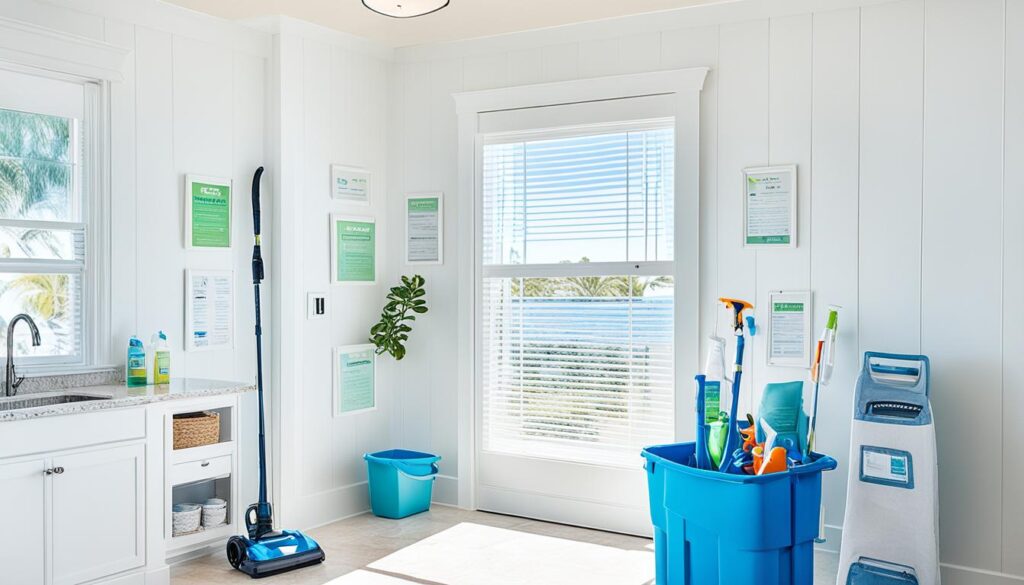
Mold Prevention Tips for Florida Real Estate Investors
Investing in real estate properties in Florida can be a lucrative endeavor, but it comes with its own set of challenges. One of the key considerations for Florida real estate investors is mold prevention. The warm and humid climate of Florida provides the ideal conditions for mold growth, making it essential to implement effective strategies to prevent mold in your properties.
In this article, we will explore valuable mold prevention tips specifically tailored for Florida real estate investors. By implementing these strategies, you can safeguard your investment, maintain a healthy living environment for your tenants, and reduce potential litigation risks.
Key Takeaways:
- Understand the unique mold challenges posed by Florida’s warm and humid climate.
- Regularly inspect your properties for any signs of mold growth.
- Address moisture issues promptly to prevent mold from thriving.
- Ensure proper ventilation throughout your properties.
- Educate tenants on mold prevention measures and encourage their cooperation.
Understanding the Unique Mold Challenges in Florida
Before diving into specific prevention strategies, it’s crucial to understand the unique mold challenges faced by real estate investors in Florida. The state’s warm and humid climate creates favorable conditions for mold growth, making prevention a top priority.
Florida’s high humidity levels provide an ideal breeding ground for mold spores to thrive. When combined with moisture from frequent rain and humidity, these conditions can lead to rapid mold growth within properties. This poses a significant risk to both the structural integrity of your investment and the health of your tenants.
Mold growth in Florida properties can also be exacerbated by factors such as inadequate ventilation, plumbing leaks, and water infiltration from hurricanes or storms. These issues further contribute to elevated moisture levels, creating an environment conducive to mold development.
As a real estate investor, it’s essential to recognize the impact of these unique mold challenges on your investment properties. By understanding the contributing factors, you can effectively implement preventive measures to minimize the risk of mold-related issues.
Factors Contributing to Mold Growth in Florida
- High humidity levels: Florida’s warm climate and proximity to bodies of water result in increased moisture in the air, providing an optimal environment for mold growth.
- Frequent rain: The state experiences regular rainfall, leading to excess moisture accumulation in buildings and surfaces.
- Inadequate ventilation: Improper airflow and ventilation systems hinder the drying process, allowing moisture to linger and mold to proliferate.
- Plumbing leaks: Leaking pipes and fixtures introduce moisture into the property, creating favorable conditions for mold colonization.
- Water intrusion from hurricanes and storms: Florida’s susceptibility to tropical storms and hurricanes heightens the risk of water intrusion, leading to significant mold issues if not promptly addressed.
By addressing these contributing factors and implementing appropriate mold prevention techniques, real estate investors can protect their properties from costly mold damage and maintain a safe living environment for tenants.

Best Practices for Mold Prevention in Florida Properties
Preventing mold growth in Florida properties requires proactive measures and adherence to best practices. By implementing the following tips and techniques, real estate investors can safeguard their investments from mold-related damage and maintain a healthy living environment for tenants.
- Regular Inspections: Conduct thorough inspections of your properties at regular intervals to detect any signs of moisture or mold. Pay close attention to areas prone to water leaks, such as roofs, windows, and plumbing systems.
- Maintain Proper Ventilation: Ensure that your properties have adequate ventilation to minimize humidity levels and promote air circulation. Proper ventilation can help prevent condensation and mold growth in areas like bathrooms, kitchens, and laundry rooms.
- Control Moisture: Address any moisture issues promptly, such as leaky pipes, roof leaks, or water intrusion. Implement effective moisture control measures like using dehumidifiers in high-humidity areas to maintain optimal moisture levels.
- Proper Drainage: Maintain proper drainage systems around your properties to divert water away from the foundation and prevent water accumulation, which can lead to mold growth.
- Appropriate Landscaping: Ensure that landscaping and irrigation systems are designed and maintained properly to prevent excess water accumulation around the property.
- Properly Sealed Windows and Doors: Inspect windows and doors regularly to ensure they are properly sealed, preventing water intrusion and minimizing the risk of mold growth.
- Mold-Resistant Materials: Consider using mold-resistant materials, such as mold-resistant drywall, flooring, and paint, during property construction or renovations to minimize the chances of mold growth.
- Tenant Education: Educate tenants about mold prevention best practices, including proper ventilation, maintaining cleanliness, and promptly reporting any signs of moisture or mold growth.
- Responsive Maintenance: Address maintenance requests promptly and professionally to prevent prolonged exposure to moisture and create a proactive approach to preventing mold growth.
By implementing these best practices, real estate investors can significantly reduce the risk of mold growth in their Florida properties, protecting their investments and ensuring the satisfaction of tenants. Remember, mold prevention is an ongoing effort that requires attention and proactive management.

Conclusion
Mold prevention is an essential part of successfully managing real estate investments in Florida. By implementing the mold prevention tips and strategies discussed in this article, you can safeguard the long-term success of your properties. Regular inspections are crucial for detecting any signs of mold growth early on and taking prompt action to address moisture issues. This proactive approach can help prevent mold from becoming a major problem, saving you time, money, and potential legal complications.
In addition to inspections, educating your tenants on mold prevention measures is key. By providing them with information and resources, such as maintaining proper ventilation, managing humidity levels, and promptly reporting any water leaks or damage, you can empower them to contribute to mold prevention efforts. A well-informed and proactive tenant base is a valuable asset when it comes to maintaining a healthy living environment and reducing the potential for mold-related issues.
If you require professional assistance with mold assessment and remediation services in Florida, consider contacting Fix Mold Miami at 305-465-6653. Their experienced team can provide expert guidance tailored to the unique mold challenges in the region and help ensure the effective mitigation of any mold issues that may arise. By working with professionals in the field, you can gain peace of mind knowing that your investment properties are in capable hands.




